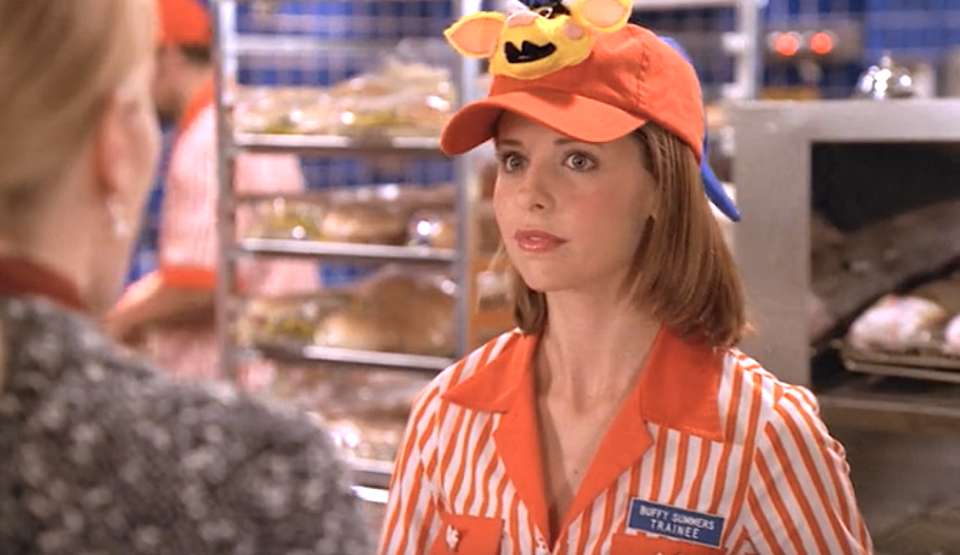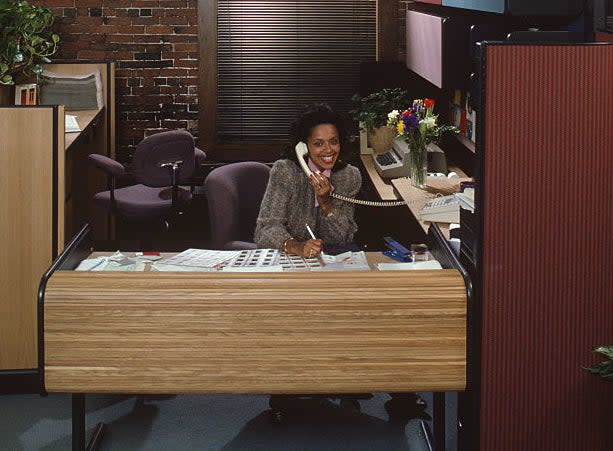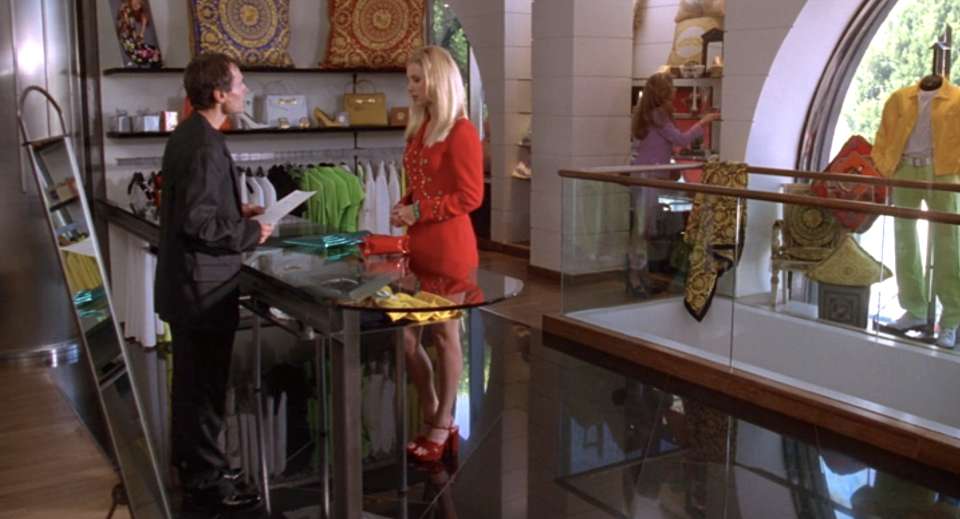8 Outdated "Professional" Workplace Rules People Wish Would Come Back, And 13 That People Say They're Super Happy To See Becoming Obsolete
I recently asked members of the BuzzFeed Community who've been in the workforce for over 20 years what used to be seen as "professional" in the workplace but is actually on its way to becoming completely outdated. And the responses ranged from dress code and hairstyles to what you can and cannot talk about at work. Here are some of the best responses:
1."Only having straight, flat, non-textured hair. I'm a director in my organization and report directly to the executive director. I have very curly frizzy hair — and I'm a professional."

—anonymous
"Policies that prohibit natural hair and hairstyles, like afros, braids, Bantu knots, and locs, and deem them 'unprofessional' are on the way out. Plus, they are becoming illegal in many places. You can actually sue an employer in many places for hair discrimination when it's a type of racial discrimination. Finally!!"
—anonymous
2."Giving a two-week notice before leaving a job."
—anonymous
3."Email etiquette is so frustratingly dated and weirdly formal. 'Dear so and so, per my last email, blah blah blah, sincerely, signature line.' It's just a time-consuming formality. Now you can message someone on Teams or Slack and be casual and direct."
4."The whole 'the customer is always right' mentality. Sure, customer service is still a relevant practice — be polite, courteous, and helpful whenever possible. But when customers start getting unreasonable or downright rude, I'm glad that it's becoming more of the norm to cut these encounters short and stick true to the rules of the establishment. 'You got your way last time at a different location? Cool, then go back to that location.' Losing the business of rude customers is a boon. Y'all can take the entitlement elsewhere."

—anonymous
5."Not talking about parental or disability leave policies with co-workers. It used to be very hush-hush, but now you can openly discuss it. When you come back, you’re still expected to work like you don’t have a kid, of course, but bigger employers now tend to advertise their parental leave as a perk."
6."No piercings. When I first started in upscale dining six years ago, ANY facial piercings had to be either covered with a small bandaid or it had to be a clear spacer. And men weren't allowed to wear earrings at all. That company recently updated its policy to allow small nose studs, and men can now wear small studs in their ears too. I think it's a good sign. My nose piercing isn't an act of rebellion; it's just jewelry. But for some people, it might be cultural, and it's important to let people express themselves."
"I have gauges and when I would go to a job interview, I would always have my hair down so the employer wouldn’t notice. But now it seems pretty okay — even cool! Times change!"
7."I started my career in 1981. The single best standard to die a richly-deserved death is that women who wished to be taken seriously had to dress in a skirt suit or dress with pantyhose and heels. I actually had a supervisor — a woman! — tell me that pants in the workplace were unprofessional. I left after a month."

—anonymous
8."A lot of employers are now listing the salary range on their job postings — some of this due to changes in the law. I think asking about salary is no longer a red flag during interviews. I am a hiring manager and have no problem when candidates ask about that whereas some of my older colleagues think it’s 'tacky' to ask about salary."
9."Not talking about your wages. This used to be considered a huge faux pas, and companies would sometimes give you trouble for talking about your wages because it revealed who was being underpaid. The conversation around that has changed. Some companies still attempt to give people trouble for it, but more and more people are openly having these discussions and discovering the subtle/hidden discriminatory practices in their workplaces."
10."It used to be facial hair was considered unprofessional and was rare to see. Beards of all varieties are now a lot more common in nearly all industries."

—anonymous
11."You make people uncomfortable if you overdress for work now. My direct manager was taken aside by our director about the suit and ties he was wearing and how they fit into the office culture as well as cutoff jeans might."
—anonymous
"I work in an office as a financial analyst, and we have a factory on-site as well. And we're allowed to wear jeans and T-shirts in the office. The reasoning behind it was that the CEO didn't want people to be able to tell the difference between the production workers and the office staff. We are all part of the same company and all working toward a common goal. One isn't 'better than' the other."
—anonymous
12."No 'unnatural' hair color. Especially in fast food and grocery stores."
"Hair — color, style, length — has nothing to do with the ability to do a job.
—anonymous
13."No visible tattoos. I think it’s great that personality is now allowed in Corporate America."

—anonymous
"I’ve worked in the medical field for over 20 years. I still have older patients ask/say things about them like, “Oh my, is that a tattoo? Wow, what are you going to do when you are older?' Umm be older with saggy tattoos, I guess!"
Now for some workplace changes that people are not so happy about:
14."Referring to senior managers as 'Mr.' or 'Mrs.' whatever. People all the way down to entry-level employees can and do call our top-level managers by their first names. I started working before that became the norm, and it still feels a little weird to me."
"Using 'sir' or 'ma'am' to address superiors. When I was growing up, my parents taught me those titles were respectful and should be used when talking to someone higher up the ladder than yourself. Now almost everyone uses first names! I still use titles and get a lot of funny looks."
—anonymous
15."Acknowledging each other. A simple good morning or hello to the person you are passing in the hallway goes a long way. Most times, I see people look away or pick up their cell phones to avoid communicating with other people."
—anonymous
16."Respect for my time. The amount of people who take the time to schedule an interview and then don't show up for it is mind-boggling."
17."The simple fact that we can’t apply for a job in person at most places. I remember after nine years of being a stay-at-home mom heading back out into the workforce, EVERY building I walked into wouldn't give me an application. I would ask, 'Are you hiring?' If it was a yes, I would ask, 'Do you have an application?' And I would get, 'I don't know. Look online,' or “Oh, the application is online only. Please go to our website.” So no face-to-face meetings with the manager and handing in an application anymore. It was a big shock to me that it changed like that in the years I was at home with the kids."

—anonymous
18."Telling me things face-to-face. Previously, if there was an issue with my conduct or leadership needed to tell me something, they would come to talk to me. But then email really started to take off, and now it doesn't happen anymore. The problem is that I don't check my email. I wish they'd just tell me what they have to tell me to my face. A professional would speak to me personally. Oddly, it's not a generational thing because the leadership failing to tell me things is older than I am."
—anonymous
19."Hand-written anything, but specifically thank you notes. It used to be normal to send thank you notes for any non-standard thing, like job interviews, emergency overtime, or solving a complex problem. Now it's a lot of pizza parties — if there is any recognition at all."

—anonymous
20."Respect for other people's time. In the old days, when you were out sick or on leave, no one bothered you. Now thanks to cell phones, colleagues will text me questions they have when I'm not there. It's gotten so bad I started going radio silent on my vacations. And it's not just colleagues who do this. Clients do it as well. We're open Monday to Friday, 8 a.m. to 4:30 p.m., but they still email me on a Sunday or grab me in a store after hours."
21.And finally, "Not swearing. In 32 years of mostly full-time employment, swearing has increased. It used to be reserved for breaks or back-of-the-house talk (away from customers and clients). Now I hear it passing by executives' offices, nurses' stations, dining rooms, etc., all with customers or clients present or part of the conversations!"
—anonymous
Submissions have been edited for length and/or clarity.

